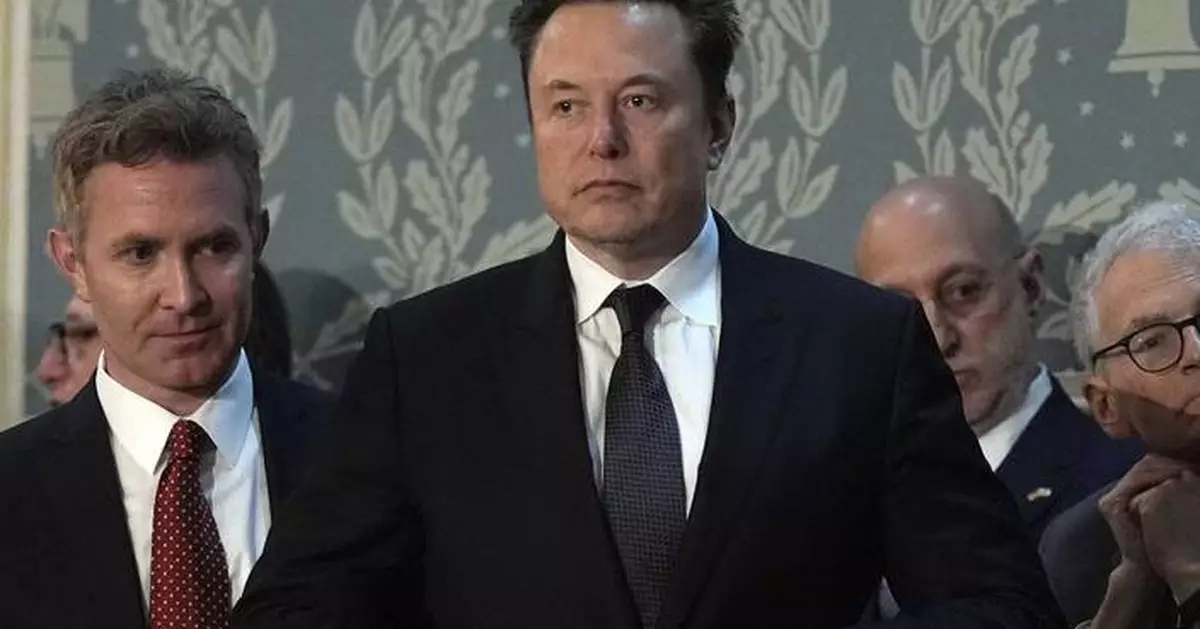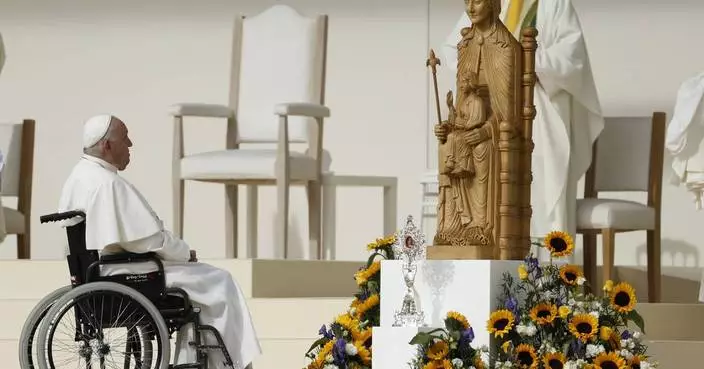WICHITA FALLS, Texas (AP) — Elon Musk's social media platform X has sued a group of advertisers, alleging that a “massive advertiser boycott” deprived the company of billions of dollars in revenue and violated antitrust laws.
The company formerly known as Twitter filed the lawsuit Tuesday in a federal court in Texas against the World Federation of Advertisers and member companies Unilever, Mars, CVS Health and Orsted.
It accused the advertising group's brand safety initiative, called the Global Alliance for Responsible Media, of helping to coordinate a pause in advertising after Musk bought Twitter for $44 billion in late 2022 and overhauled its staff and policies.
Musk posted about the lawsuit on X on Tuesday, saying “now it is war” after two years of being nice and “getting nothing but empty words.”
X CEO Linda Yaccarino said in a video announcement that the lawsuit stemmed in part from evidence uncovered by the U.S. House Judiciary Committee which she said showed a “group of companies organized a systematic illegal boycott” against X.
The Republican-led committee had a hearing last month looking at whether current laws are “sufficient to deter anticompetitive collusion in online advertising.”
The lawsuit’s allegations center on the early days of Musk’s Twitter takeover and not a more recent dispute with advertisers that came a year later.
In November 2023, about a year after Musk bought the company, a number of advertisers began fleeing X over concerns about their ads showing up next to pro-Nazi content and hate speech on the site in general, with Musk inflaming tensions with his own posts endorsing an antisemitic conspiracy theory.
Musk later said those fleeing advertisers were engaging in “blackmail” and, using a profanity, essentially told them to go away.
The Belgium-based World Federation of Advertisers and representatives for CVS, Orsted, Mars and Unilever didn’t immediately respond to requests for comment Tuesday.
A top Unilever executive testified at last month's congressional hearing, defending the British consumer goods company's practice of choosing to put ads on platforms that won't harm its brand.
“Unilever, and Unilever alone, controls our advertising spending,” said prepared written remarks by Herrish Patel, president of Unilever USA. “No platform has a right to our advertising dollar.”
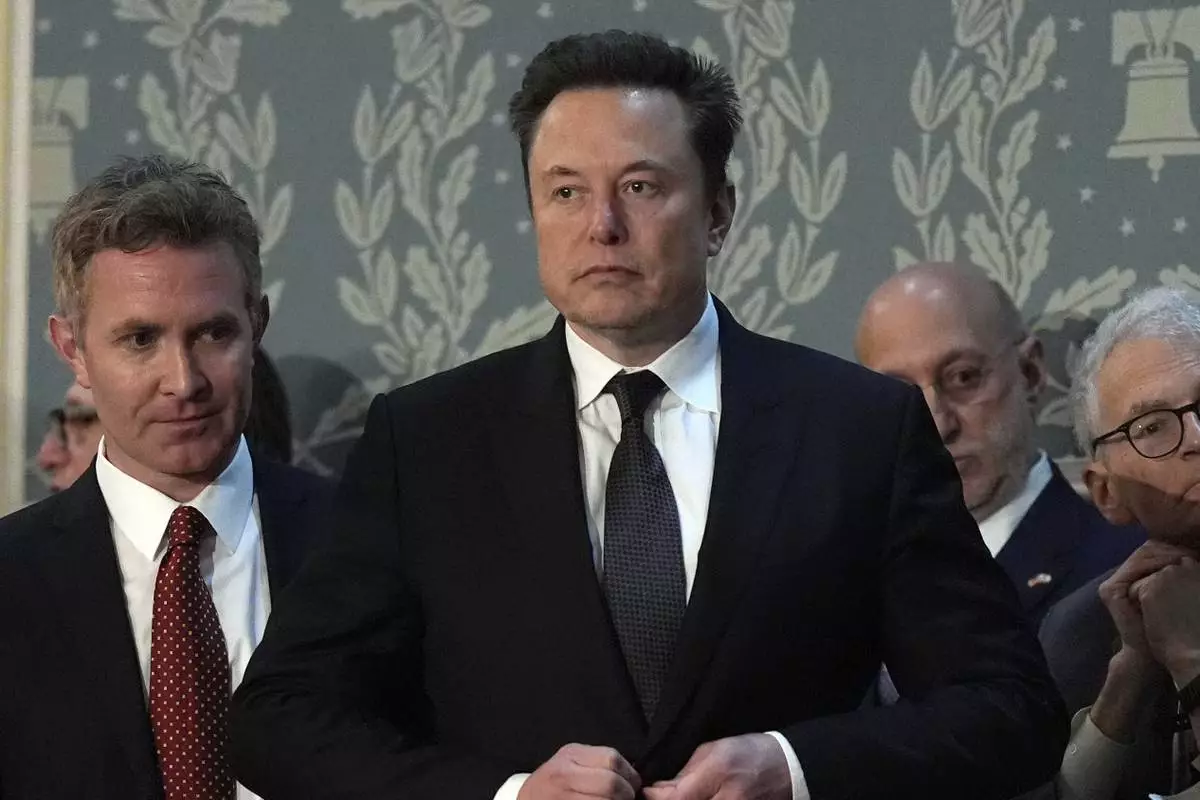
FILE - Elon Musk arrives before a joint meeting of Congress at the Capitol in Washington, July 24, 2024. (AP Photo/Julia Nikhinson, File)
MAGDEBURG, Germany (AP) — A 9-year-old was among the five people killed in the Christmas market attack in the German city of Magdeburg, an official said Saturday.
City official Ronni Krug said he didn’t have further information on the adults who were killed. He said there were a total of 205 victims, including the five dead. He said that 41 people were seriously or very seriously injured.
Prosecutor Horst Nopens said the suspect, a 50-year-old Saudi doctor, is under investigation on suspicion of murder, attempted murder and bodily harm. He is currently being questioned.
THIS IS A BREAKING NEWS UPDATE. AP’s earlier story follows below.
MAGDEBURG, Germany (AP) — Germans on Saturday mourned the victims and their shaken sense of security after a Saudi doctor intentionally drove into a Christmas market teeming with holiday shoppers, killing at least five people, including a small child, and wounding at least 200 others.
Authorities arrested a 50-year-old man at the site of the attack in Magdeburg on Friday evening and took him into custody for questioning. He has lived in Germany since 2006, practicing medicine in Bernburg, about 40 kilometers (25 miles) south of Magdeburg. officials said.
The state governor, Reiner Haseloff, told reporters that the death toll rose to five from a previous figure of two and that more than 200 people in total were injured.
Chancellor Olaf Scholz said that nearly 40 of them "are so seriously injured that we must be very worried about them.”
“There is no more peaceful and cheerful place than a Christmas market,” Scholz said. “What a terrible act it is to injure and kill so many people there with such brutality.”
Neurosurgeon Mahmoud Elenbaby said some 80 patients were brought to Magdeburg’s university hospital on Friday night.
“We managed to stabilize most of them, but many are still in intensive care, and some are also in critical condition,” Elenbaby told The Associated Press as he dashed into the hospital cafeteria to buy himself a cola.
Several German media outlets identified the suspect as Taleb A., withholding his last name in line with privacy laws, and reported that he was a specialist in psychiatry and psychotherapy.
Mourners lit candles and placed flowers outside a church near the market on the cold and gloomy day. Several people stopped and cried. A Berlin church choir whose members witnessed a previous Christmas market attack in 2016 sang Amazing Grace, a hymn about God's mercy, offering their prayers and solidarity with the victims.
There were still no answers Saturday as to what motivated the man to drive his black BMW into a crowd in the eastern German city.
Describing himself as a former Muslim, the suspect shared dozens of tweets and retweets daily focusing on anti-Islam themes, criticizing the religion and congratulating Muslims who left the faith.
He also accused German authorities of failing to do enough to combat what he said was the “Islamism of Europe.”
The violence shocked Germany and the city, bringing its mayor to the verge of tears and marring a festive event that’s part of a centuries-old German tradition. It prompted several other German towns to cancel their weekend Christmas markets as a precaution and out of solidarity with Magdeburg’s loss. Berlin kept its markets open but has increased its police presence at them.
Germany has suffered a string of extremist attacks in recent years, including a knife attack that killed three people and wounded eight at a festival in the western city of Solingen in August.
Magdeburg is a city of about 240,000 people, west of Berlin, that serves as Saxony-Anhalt’s capital. Friday’s attack came eight years after an Islamic extremist drove a truck into a crowded Christmas market in Berlin, killing 13 people and injuring many others. The attacker was killed days later in a shootout in Italy.
Chancellor Scholz and Interior Minister Nancy Faeser traveled to Magdeburg on Saturday, and a memorial service is to take place in the city cathedral in the evening. Faeser ordered flags lowered to half-staff at federal buildings across the country.
Verified bystander footage distributed by the German news agency dpa showed the suspect’s arrest at a tram stop in the middle of the road. A nearby police officer pointing a handgun at the man shouted at him as he lay prone, his head arched up slightly. Other officers swarmed around the suspect and took him into custody.
Thi Linh Chi Nguyen, a 34-year-old manicurist from Vietnam whose salon is located in a mall across from the Christmas market, was on the phone during a break when she heard loud bangs and thought at first they were fireworks. She then saw a car drive through the market at high speed. People screamed and a child was thrown into the air by the car.
Shaking as she described the horror of what she witnessed, she recalled seeing the car bursting out of the market and turning right onto Ernst-Reuter-Allee street and then coming to a standstill at the tram stop where the suspect was arrested.
The number of injured people was overwhelming.
“My husband and I helped them for two hours. He ran back home and grabbed as many blankets as he could find because they didn’t have enough to cover the injured people. And it was so cold," she said.
The market itself was still cordoned off Saturday with red-and-white tape and police vans every 50 meters (yards). Police with machine pistols guarded every entry to the market. Some thermal security blankets still lay on the street.
Christmas markets are a German holiday tradition cherished since the Middle Ages, now successfully exported to much of the Western world.
Moulson reported from Berlin and Gera from Warsaw, Poland.

A blanket lies on a Christmas Market, where a car drove into a crowd on Friday evening, in Magdeburg, Germany, Saturday, Dec. 21, 2024. (AP Photo/Michael Probst)

Policemen guard a Christmas Market, where a car drove into a crowd on Friday evening, in Magdeburg, Germany, Saturday, Dec. 21, 2024. (AP Photo/Michael Probst)

Policemen guard a Christmas Market, where a car drove into a crowd on Friday evening, in Magdeburg, Germany, Saturday, Dec. 21, 2024. (AP Photo/Michael Probst)
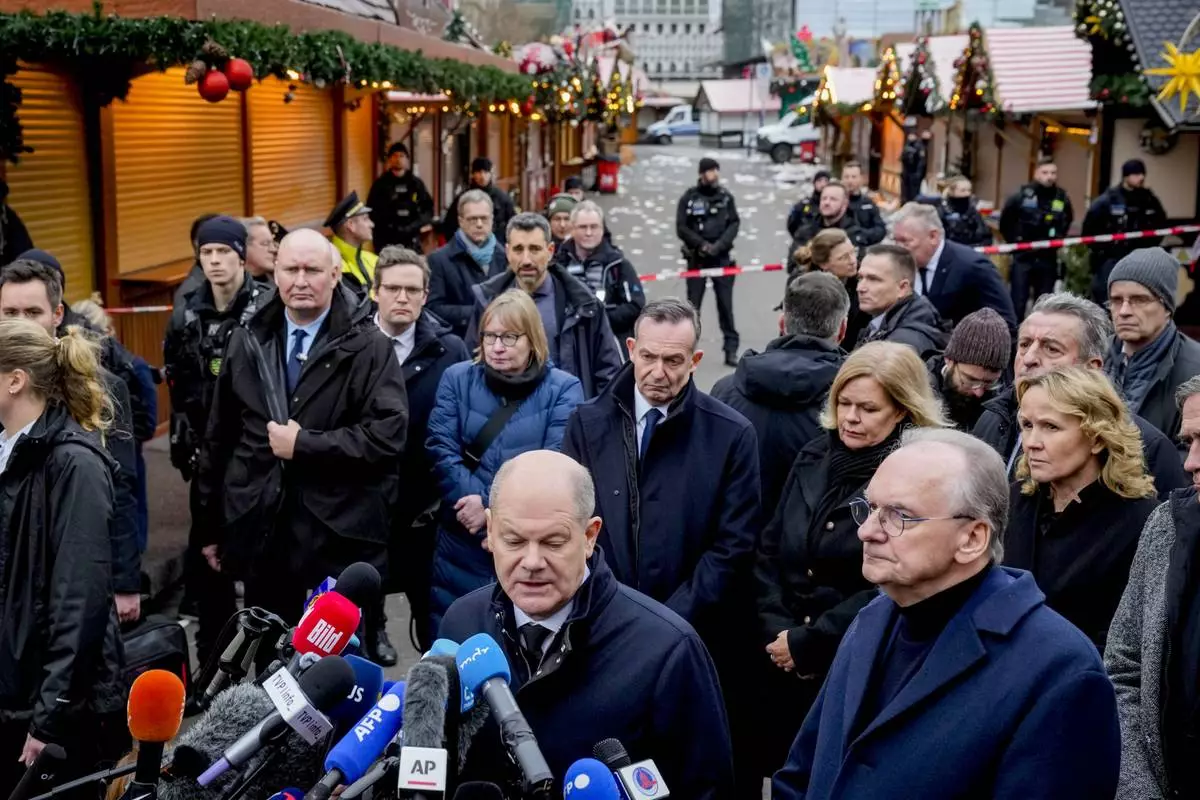
German Chancellor Olaf Scholz, centre, speaks at a Christmas Market, where a car drove into a crowd on Friday evening, in Magdeburg, Germany, Saturday, Dec. 21, 2024. (AP Photo/Michael Probst)

Citizens pay tribute to deaths outside St. John's Church near a Christmas Market, where a car drove into a crowd on Friday evening, in Magdeburg, Germany, Saturday, Dec. 21, 2024. (AP Photo/Ebrahim Noorozi)

Citizens pay tribute and cry for deaths outside St. John's Church near a Christmas Market, where a car drove into a crowd on Friday evening, in Magdeburg, Germany, Saturday, Dec. 21, 2024. (AP Photo/Ebrahim Noorozi)

A policeman, right, stands on a Christmas Market, where a car drove into a crowd on Friday evening, in Magdeburg, Germany, Saturday, Dec. 21, 2024. (AP Photo/Michael Probst)

Citizens pay tribute to deaths outside St. John's Church near a Christmas Market, where a car drove into a crowd on Friday evening, in Magdeburg, Germany, Saturday, Dec. 21, 2024. (AP Photo/Ebrahim Noorozi)

Two firefighters walk through a cordoned-off area near a Christmas Market, after a car drove into a crowd in Magdeburg, Germany, Saturday, Dec. 21, 2024. (AP Photo/Ebrahim Noroozi)

A damaged car sits with its doors open after a driver plowed into a busy Christmas market in Magdeburg, Germany, early Saturday, Dec. 21, 2024. (Hendrik Schmidt/dpa via AP)

Police stand at a Christmas market in Magdeburg, Germany, early Saturday, Dec. 21, 2024, after a driver plowed into a group of people at the market late Friday. (Hendrik Schmidt/dpa via AP)

Police stand at a Christmas market in Magdeburg, Germany, early Saturday, Dec. 21, 2024, after a driver plowed into a group of people at the market late Friday. (Hendrik Schmidt/dpa via AP)

A damaged car sits with its doors open after a driver plowed into a busy Christmas market in Magdeburg, Germany, early Saturday, Dec. 21, 2024. (Hendrik Schmidt/dpa via AP)

Police officers and police emergency vehicles are seen at the Christmas market in Magdeburg after a driver plowed into a busy Christmas market in Magdeburg, Germany, Saturday, Dec. 21, 2024. (Matthias Bein/dpa via AP)

Security guards stand in front of a cordoned-off Christmas Market after a car crashed into a crowd of people, in Magdeburg, Germany, Saturday early morning, Dec. 21, 2024. (AP Photo/Ebrahim Noroozi)

A barrier tape and police vehicles are seen in front of the entrance to the Christmas market in Magdeburg after a driver plowed into a busy Christmas market in Magdeburg, Germany, Saturday, Dec. 21, 2024. (Sebastian Kahnert/dpa via AP)

The car that was crashed into a crowd of people at the Magdeburg Christmas market is seen following the attack in Magdeburg, Germany, Saturday early morning, Dec. 21, 2024. (AP Photo/Ebrahim Noroozi)

People mourn in front of St. John's Church for the victims of Friday's attack at the Christmas market in Magdeburg, Germany, Saturday, Dec. 21, 2024. (Matthias Bein/dpa via AP)

Police tape cordons-off a Christmas Market, where a car drove into a crowd on Friday evening, in Magdeburg, Germany, Saturday, Dec. 21, 2024. (AP Photo/Ebrahim Noroozi)

A police officer stands guard at at a cordoned-off area near a Christmas Market, where a car drove into a crowd on Friday evening, in Magdeburg, Germany, Saturday, Dec. 21, 2024. (AP Photo/Ebrahim Noroozi)

Police officers patrol a cordoned-off area at a Christmas Market, where a car drove into a crowd on Friday evening, in Magdeburg, Germany, Saturday, Dec. 21, 2024. (AP Photo/Ebrahim Noroozi)

Security guards stand in front of a cordoned-off Christmas Market after a car crashed into a crowd of people, in Magdeburg, Germany, Saturday, Dec. 21, 2024. (AP Photo/Ebrahim Noroozi)

Emergency services work in a cordoned-off area near a Christmas Market, after a car drove into a crowd in Magdeburg, Germany, Saturday, Dec. 21, 2024. (AP Photo/Ebrahim Noroozi)

Emergency services work in a cordoned-off area near a Christmas Market, after a car drove into a crowd in Magdeburg, Germany, Friday, Dec. 20, 2024. (AP Photo/Ebrahim Noroozi)

Emergency services work in a cordoned-off area near a Christmas Market, after a car drove into a crowd in Magdeburg, Germany, Friday, Dec. 20, 2024. (AP Photo/Ebrahim Noroozi)

Reiner Haseloff, Minister President of Saxony-Anhalt, center, is flanked by Tamara Zieschang, Minister of the Interior and Sport of Saxony-Anhalt, left, and Simone Borris, Mayor of the City of Magdeburg, at a press conference after a car plowed into a busy outdoor Christmas market in Magdeburg, Germany Friday, Dec. 20, 2024. (Hendrik Schmidt/dpa via AP)

Emergency services work in a cordoned-off area near a Christmas Market, after a car drove into a crowd in Magdeburg, Germany, Friday, Dec. 20, 2024. (AP Photo/Ebrahim Noroozi)

Emergency services work in a cordoned-off area near a Christmas Market, after a car drove into a crowd in Magdeburg, Germany, Friday, Dec. 20, 2024. (AP Photo/Ebrahim Noroozi)

Emergency services work in a cordoned-off area near a Christmas Market, after a car drove into a crowd in Magdeburg, Germany, Friday, Dec. 20, 2024. (AP Photo/Ebrahim Noroozi)

A police officer guards at a blocked road near a Christmas Market, after an incident in Magdeburg, Germany, Friday, Dec. 20, 2024. (AP Photo/Ebrahim Noroozi)

Emergency services attend an incident at the Christmas market in Magdeburg, Germany, Friday Dec. 20, 2024. (Dörthe Hein/dpa via AP)

Emergency services attend an incident at the Christmas market in Magdeburg, Germany, Friday Dec. 20, 2024. (Heiko Rebsch/dpa via AP)

Emergency services attend an incident at the Christmas market in Magdeburg, Germany, Friday Dec. 20, 2024. (Heiko Rebsch/dpa via AP)

A police officer guards at a cordoned-off area near a Christmas Market after an incident in Magdeburg, Germany, Friday, Dec. 20, 2024. (AP Photo/Ebrahim Noroozi)

In this screen grab image from video, special police forces attend an incident at the Christmas market in Magdeburg, Germany, Friday Dec. 20, 2024. (Thomas Schulz/dpa via AP)

Reiner Haseloff (M, CDU), Minister President of Saxony-Anhalt, makes a statement after an incident at the Christmas market in Magdeburg, Germany, Friday Dec. 20, 2024. (Heiko Rebsch/dpa via AP)
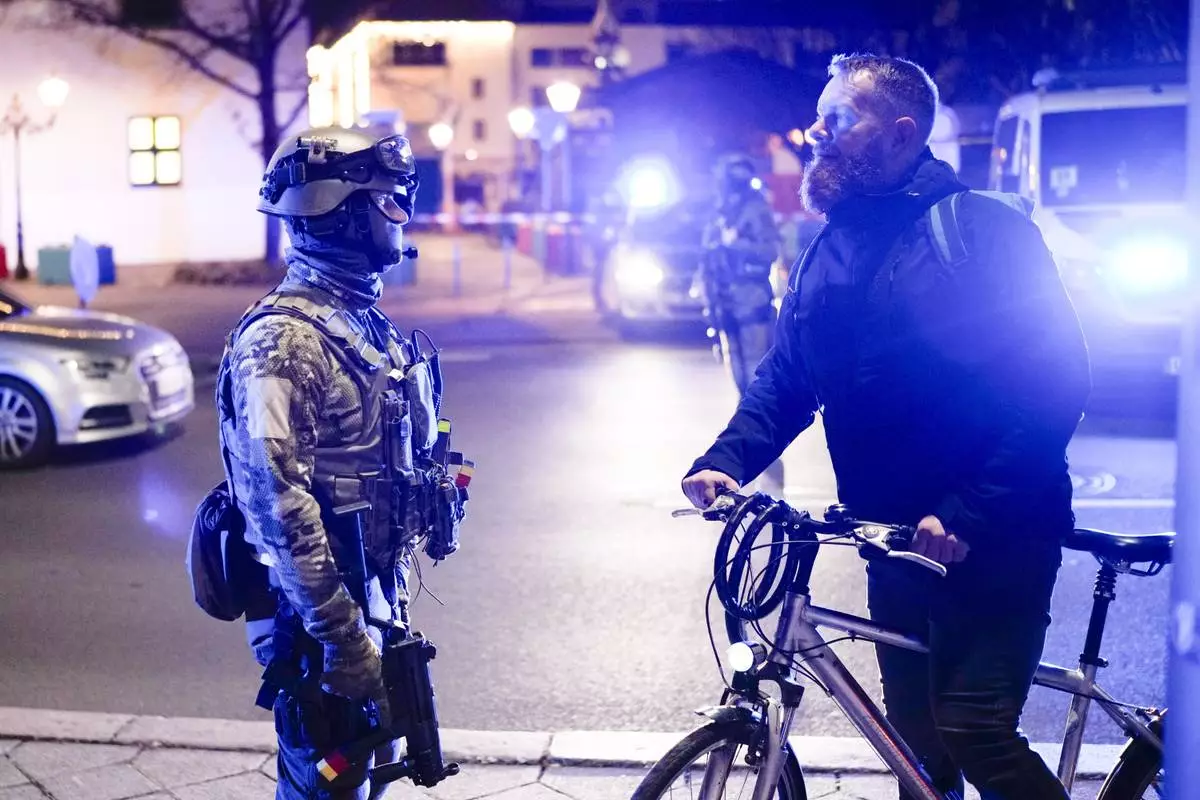
A police officer speaks with a man at a cordoned-off area near a Christmas Market after an incident in Magdeburg, Germany, Friday, Dec. 20, 2024. (AP Photo/Ebrahim Noroozi)

A policeman is seen at the Christmas market where an incident happened in Magdeburg, Germany, Friday Dec. 20, 2024. (Heiko Rebsch/dpa via AP)

A firefighter walks through a cordoned-off area near a Christmas Market, after a car drove into a crowd in Magdeburg, Germany, Saturday, Dec. 21, 2024. (AP Photo/Ebrahim Noroozi)

Emergency services work in a cordoned-off area near a Christmas Market, after an incident in Magdeburg, Germany, Friday, Dec. 20, 2024. (AP Photo/Ebrahim Noroozi)

A view of the cordoned-off Christmas market after an incident in Magdeburg, Germany, Friday Dec. 20, 2024. (Heiko Rebsch/dpa via AP)

A police officer guards at a blocked road near a Christmas market after an incident in Magdeburg, Germany, Friday, Dec. 20, 2024. (AP Photo/Ebrahim Noroozi)

The car that was crashed into a crowd of people at the Magdeburg Christmas market is seen following the attack in Magdeburg, Germany, Saturday early morning, Dec. 21, 2024. (AP Photo/Ebrahim Noroozi)

Security guards stand in front of a cordoned-off Christmas Market after a car crashed into a crowd of people, in Magdeburg, Germany, Saturday early morning, Dec. 21, 2024. (AP Photo/Ebrahim Noroozi)

Security guards stand in front of a cordoned-off Christmas Market after a car crashed into a crowd of people, in Magdeburg, Germany, Saturday early morning, Dec. 21, 2024. (AP Photo/Ebrahim Noroozi)

The car that was crashed into a crowd of people at the Magdeburg Christmas market is seen following the attack in Magdeburg, Germany, Saturday early morning, Dec. 21, 2024. (AP Photo/Ebrahim Noroozi)

Forensics work on a damaged car sitting with its doors open after a driver plowed into a busy Christmas market in Magdeburg, Germany, early Saturday, Dec. 21, 2024. (Hendrik Schmidt/dpa via AP)



